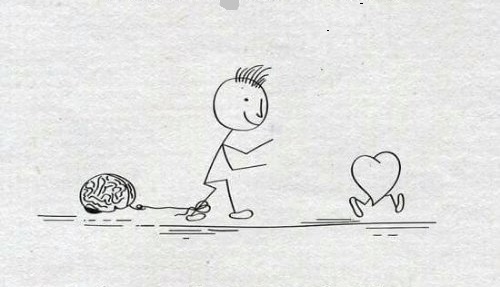Peace from mind
There is a concept called ‘emotional leakage’; it’s about letting your emotions overflow into your external behaviour. In simpler terms, you show exactly what you’re feeling.
Like this article notes: “For overcontrolled (OC) people who tend have a lot of impulse control, showing a flood of emotion externally and in a situation where others can see it, might be very uncomfortable or shame-provoking. Emotional leakage happens when an OC persons self-control has failed and their inner feelings are revealed and expressed more intensely than preferred. Emotional leakage isn’t a problem per se, except when it’s followed by self-criticism.”
This leakage, however, is often expressed in negative terms – in psychosomatic symptoms which our body uses to raise the alarm, to signify to us that something is wrong, that the entire system is not working properly and we need to change something.
If you think about it, when we’re happy, when we’re satisfied with work, we have a steady income, a stable life rhythm, everything seems to be going perfectly and the whole world appears wonderful in our eyes. But when an adversity strikes, when unexpectedly you’re forced to search for another way of surviving the increasing expenses and nothing seems certain, you view the world much differently and not so idyllic.
We’ve all been on both sides of this spectrum. But we tend to forget it or overlook it.
“Happiness itself is fleeting,” says Rob Dial in this fantastic podcast titled “You don’t want to be happy”.
He explains that happiness is an emotion. And just like any emotion, it will be passing and gone eventually. Emotions change. So, what we want more than happiness is peace. Because peace is a state we enter in, and it’s harder to get in and out of a state rather than in and out of an emotion.
In the moments of our greatest happiness, we’re in our moments of greatest peace. Because we’re right there in that moment, thinking of nothing else. In our highest moments in life, we are so present in them that nothing outside them exists. You’re not thinking of your to-do list or of past mistakes or future challenges. Your mind simply goes quiet. And that constant story inside your head doesn’t seem to be screaming at you. That dumb story you’re telling yourself about who you are and why you’re that way is quiet in your highest moments. You reach a state of euphoria.
We want that peace from mind. From our thoughts. From our own self.
The mind is an extraordinary organ. It tries to protect us by fast forwarding about what’s going to happen and projecting into the future – it’s how we survive. It considers potential threats in order to keep us safe. But if you manage to focus in the present moment, your mind goes quiet.
The mind is an amazing yet complex tool. But we’re not taught how to use or control it. And instead, this tool becomes the master when it’s supposed to be our servant.
We have millions of ways to distract ourselves constantly – screens of all sorts, abundant information everywhere – it all stimulates our mind and keeps us wanting more. We become addicted to the temporary high.
However, there are various techniques to help you reach that much-needed state of peace. Meditation, for example, is tyring to get you to a state where you’re free from your mind. Allow yourself to calm down. It takes time, but it’s worth it once you get there.
Mindfulness is to place yourself in situations you find peace of mind as often as possible. Focus on that very moment and disregard everything else. It will help reduce stress, lengthen attention span, maximise awareness, decrease anxiety, etc. Our mind is like a computer – in some, like myself, there are at least two browsers running with a dozen tabs open in each. At some point, it will start being held back and running slower. We need a restart every now and again to reboot and refuel.
Fear, stress, anxiety, and worry are all programmes of the mind. We need to cultivate silence as much as possible. To silence our thoughts, place things in order, and see things a bit more clearly.
If we take things one steady step at a time, perhaps they will work out more effectively and without harming our health in the meantime.










